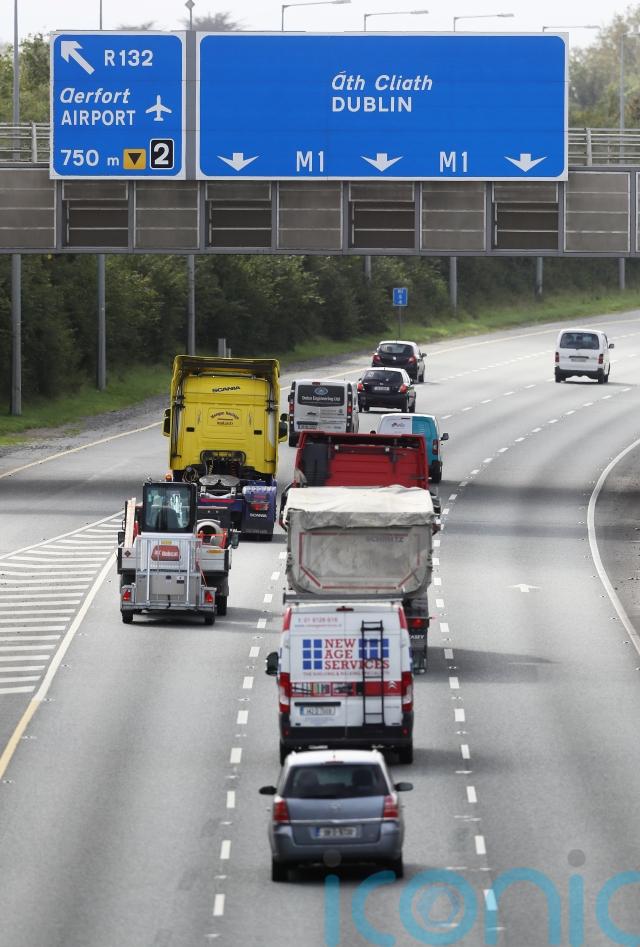
The Government will slash the distance of car journeys and clamp down on parking spaces as part of its climate action plan, it is understood.
The plan, which will set out how the Government will achieve the agreed sectoral emissions targets and the overall target of a 51% reduction by 2030 and net zero by 2050, will be published on Wednesday.
The Cabinet will meet on Wednesday afternoon to sign off on the plan.

While it is understood there is no specific commitment to congestion charges within the plan, the Government is considering them as one of their options.
They would only be brought in where there are viable alternatives to cars, including good public transport and active travel.
The plan will encourage the public to take other forms of transport and reduce the use of and dependency on cars.
It will aim to reduce the total distance driven across all car journeys by 20%, and to have nearly one in three private cars as an electric vehicle by 2030.
The plan is also expected to recommend reducing public sector parking but will only apply where there is good public transport.
It is also expected to remove minimum car parking requirements but, again, only where there is good public transport.
The plan will also include a reduction of on-street parking to prioritise active travel and public transport and to “improve the public realm”.
Local authorities will also be encouraged to move towards the “market pricing” of car parking – again where there is good public transport.
The climate plan will also include a proposal to install solar panels on all new residential buildings and public buildings and all schools by 2025.
A new green electricity tariff will also be developed by 2025 to incentivise people to use lower cost renewable electricity at times of high wind and solar generation.
Minister for Finance Michael McGrath said the measures will be “burdensome” for people, but he urged the public to remember it is to protect the natural environment.
“This is in essence, the first statutory plan which is underpinned by law and, of course, these are not just Irish targets, they are European targets and we signed up to international obligations as well,” Mr McGrath said on Wednesday.
“When you go through the individual items I am conscious that can seem like a chore to a lot of people because we’re going to be asking for sacrifices.
“I do think we have to remember why we’re doing it. It is about protecting the natural environment, it’s about enriching our biodiversity, it’s about making sure we have clean water around the country, and that we’re breathing clean air.
“I think sometimes we just have to remind ourselves the overall purpose of all of these different measures and these different impositions that we are asking of people.”
He told RTE’s Morning Ireland programme that the transport sector will have to make a “very significant contribution”.
“That will involve modal shift, it will involve greater emphasis on public transport,” he added.
“We are really conscious that we have to give people a clear alternative. If we want people to leave the private car behind them, then they have to see that there is a practical substitute that works for them and that is the challenge.
“I think when people see the way in which we reduce public transport fares, 50% for young people, 20% across the general population, we are continuing to have right through next year.”
Asked whether ministers, TDs and senators will be asked to give up their car parking space at Leinster House, Mr McGrath said there can be no exceptions once the policies have been agreed.
“I think the important principle is that whatever is decided for the general population or for the public sector generally, has to apply across the board. There cannot be exceptions.
“Colleagues travel from all over the country where there may not be currently a viable public transport solution. The same applies to other workers who are travelling to work every single day from the public sector and the private sector.
“Whatever rules are finally decided on and new policies arise, they have to apply across the board and not have exceptions for politicians.”
He said that while further detail will be provided in the plan published on Wednesday, more clarity will be given in the next coming weeks.
Asked whether the plan published on Wednesday will include details about congestion charges, Mr McGrath said: “You will get some detail today in general, but you will also have further detail then in a list of actions that will be set out in annexes of the climate action plan and those will be published in the coming weeks.”
Subscribe or register today to discover more from DonegalLive.ie
Buy the e-paper of the Donegal Democrat, Donegal People's Press, Donegal Post and Inish Times here for instant access to Donegal's premier news titles.
Keep up with the latest news from Donegal with our daily newsletter featuring the most important stories of the day delivered to your inbox every evening at 5pm.